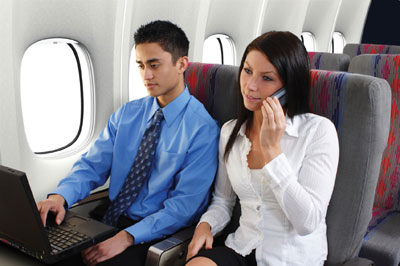
Features
Regulations
Safety
At The Gate: ‘Please turn off your iPhone, sir…’
Many travellers are all too familiar with the inconvenience experienced when a flight attendant asks passengers to turn off cellphones and other electronic devices while on an airplane.
May 8, 2012 By Brian Dunn
Many travellers are all too familiar with the inconvenience experienced when a flight attendant asks passengers to turn off cellphones and other electronic devices while on an airplane. The most celebrated case involved actor Alec Baldwin, who was kicked off an American Airlines flight last December in Los Angeles for playing the game Words With Friends.
 |
|
| The ban on cellphones also acts as a precautionary measure against potential crowd safety issues caused by phone use.
|
Some regard the cellphone ban as an inconvenience, while others view it as a blessing, providing some relief from the constant noise caused by phone conversations. But what is the logic behind the ban on the use of phones in an aircraft? It’s a matter of safety and there are several reasons the ban exists.
The main reason electronic devices are banned is because of potential interference with the aircraft’s navigation and communication systems. The U.S. Federal Aviation Administration (FAA) fears that electronic signals from these small devices may interfere with instruments in the cockpit and place passengers at risk. The same ban applies in Canada.
The only exception is if a cellphone has been EMI (electro magnetic interference) tested, but that’s hard to police, says Capt. Barry Wiszniowski, chair, flight safety division, Air Canada Pilots Association. “However, the electronic flight bags used in the cockpit have all been EMI tested,” he says.
There is also concern about interference on the ground. According to the Federal Communication Commission, the official explanation of why cellphone use is prohibited onboard is twofold. The FCC argues that cellphones could cause potential interference with the aviation electronics of some airplanes as well as cause problems with cell towers on the ground.
And although researchers have been unable to arrive at a definitive conclusion on the dangers of cellphone use on airplanes, if a cellphone does cause a problem, it places hundreds of passengers at risk. Seeing this increased risk as unacceptable, regulatory bodies maintain a blanket ban on cellphones. In addition, technology in small electronics tends to develop and change so rapidly that it would be virtually impossible for airlines to test each one. As such, an outright ban is a secure and practical option.
Several airlines have acknowledged that apart from being a precautionary measure against electronic interference, the ban on cellphones also acts as a precautionary measure against potential crowd safety issues caused by phone use. In addition, fears have grown since 9-11 that cellphones may be used to co-ordinate terrorist activities on airplanes.
Though it may be considered an inconvenience by some, some studies have shown that the majority of travellers would prefer to switch off rather than endure the excess noise created by phone conversations.
Ironically, although electronic devices are banned during flight, mobile technology will soon make airport check-in the exception rather than the rule as terminals and airlines boost connectivity with smartphones, according to a study by travel technology company Amadeus.
The report, called “From Chaos to Collaboration,” also says airlines will develop “intelligent” tickets that update people on delays and tags that track individual bags around the world. Computer-game and “augmented-reality” technology could be used to enhance airport transit and terminal shops will tap digital spending records to help lure transiting passengers, the report says.
“We’re just starting to realize . . . the impact the mobile will have,” notes Denis Lacroix, Amadeus’s vice-president for product development, in the report. “The fact that literally everyone within three to five years will have the rough equivalent of an iPhone or lightweight smart device will profoundly change the way a trip takes place.”
Airlines are already using wireless links to streamline travel. Some have introduced a smartphone application, allowing clients to search and book flights on their handsets as well as check their flight’s status. Last August, British Airways was one of the first carriers to issue Apple iPad tablet computers to its crews loaded with information on frequent flyers with the aim of providing a bespoke in-flight service.
However, security concerns are likely to restrict the use of wireless applications at border crossings, the report says.
So, although cellphones are currently banned on board, they will soon help you book your trip that much faster.